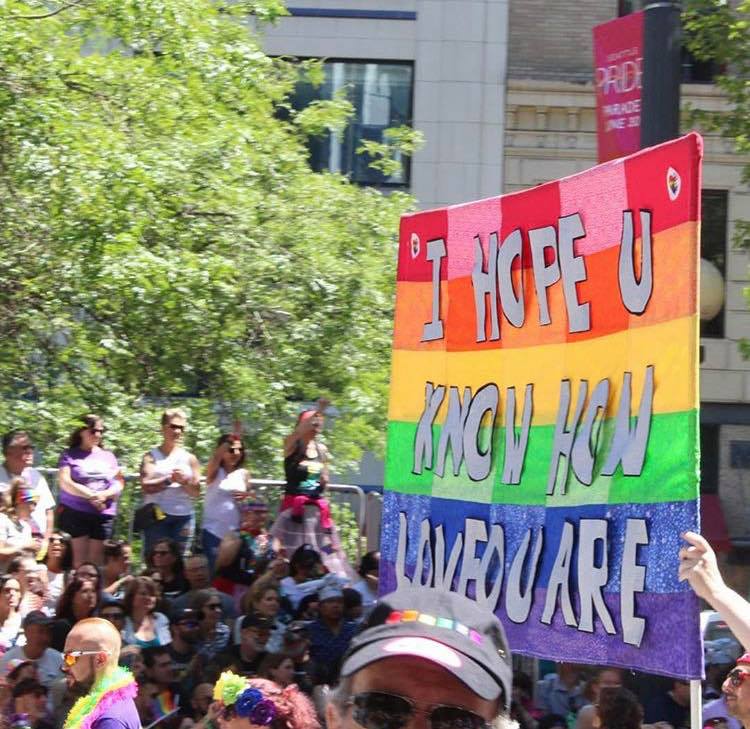Local school sparks debate with anti-LGBT sentiment
Members of the LGBT community marching in the 2018 Seattle Pride Parade
Religion has existed in school for almost as long as school itself. In 1962, school-led prayer was finally taken out of public schools. That being said, private schools can still teach ideas of religion and conduct chapels and prayers.
These religious teachings often involve relevant social issues, and seem to institute a negative mentality on those outside of their in-group.
Last month it was made public that King’s School, a local private school, sent out a newsletter denouncing same-sex relationships.
“King’s upholds the historical Biblical standard of morality that sexual expression is confined within the marriage of one man and one woman,” the newsletter stated.
This is a very unwelcoming statement for LGBT students. However, students from this school say that the anti-LGBT stigmas existed long before this newsletter.
My brother, Hunter Vogt, is an alumnus from King’s. Soon after graduating, he publicly came out as gay. The reason he waited was largely due to his schooling.
“I felt that if people knew about me they would treat me poorly. I didn’t want to be an outcast,” Vogt explained. “It’s not like the school directly said being gay was a disease, but you definitely felt something there. Something beyond playground insults, like real distaste for being different.”
That’s the issue here: if it does not appear on the surface level to be outwardly discriminatory, few see the need to address the situation. However, schools have much more subtle ways of setting this precedent. Early on the idea is set that boys like girls, girls like boys, and that’s how it should be. Nothing else.
This makes LGBT kids feel different than their peers, and when the school later goes on to confirm that they do not support anything beyond boys liking girls and girls liking boys, they feel even more like outcasts.
An argument used in this situation is that going to a religious school is a choice. It is true that someone is deciding whether or not the student goes to a secular school or not. However, the parents make that decision, not the student. Often times when religious beliefs are taught alongside regular schooling it can be difficult to separate the two. Children are frequently taught Bible studies alongside math and science, which can be confusing when presented the scientifically proven facts of both subjects.
Religious beliefs are founded in ambiguity, and that ambiguity is often what keeps religion alive. Religion can neither be proven or disproved. Certain aspects have been disproved, yet are still held to the standard of fact.
In seventh grade, a student in an Earth Science class at King’s would find themselves learning that the Earth is 6000 years old, and findings of fossils and evidence of the earth being older than that is either incorrect or completely falsified. A documentary was shown one day in class that stated dinosaur fossils were made out of fake plaster to push the ‘atheist agenda’.
This is a common practice in religious schooling; being the victim. In eight grade history the law that took publicly instituted prayer out of schools was taught as an attack on Christians and was considered by the teacher to be a dark day in American history.
Teachings of religion are taught in ninth grade, and all forms of common religion are taught. They are also taught with the disclaimer of ‘this is what these people choose to believe.’
This victim ideology creates even more hate within the in-group. Children going to King’s grow up being taught that atheists were evil, wrong people, and that it was the responsibility of their parents to tell them otherwise.
Contrary to the belief of many, non-secular schools are not telling students to be non-secular, they are simply not addressing religion until students are ready to handle it and make their own decisions. Religion is a disputable choice.
Now the argument cannot be made to get rid of these schools, as that would violate actual laws in place. However, it shows that sending children to religious schools can create a negative precedent, and teaching children about religion through the means of church or their home life results in a much more neutral mindset about religion.
If you want to send your child to a religious school, by all means do it, but be ready to combat the prejudice and incorrect teachings that go along with it.











